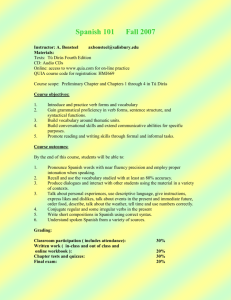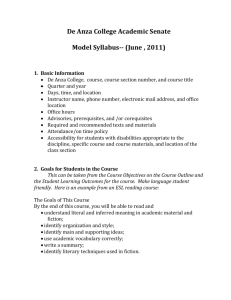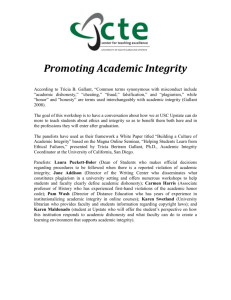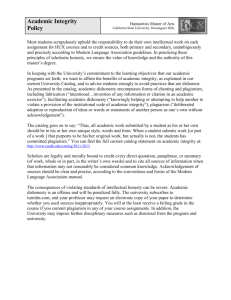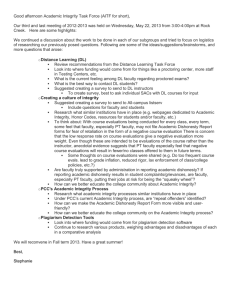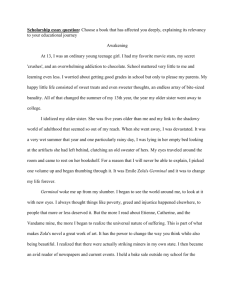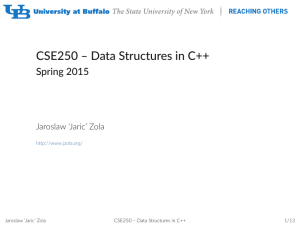French 351 - Salisbury University
advertisement
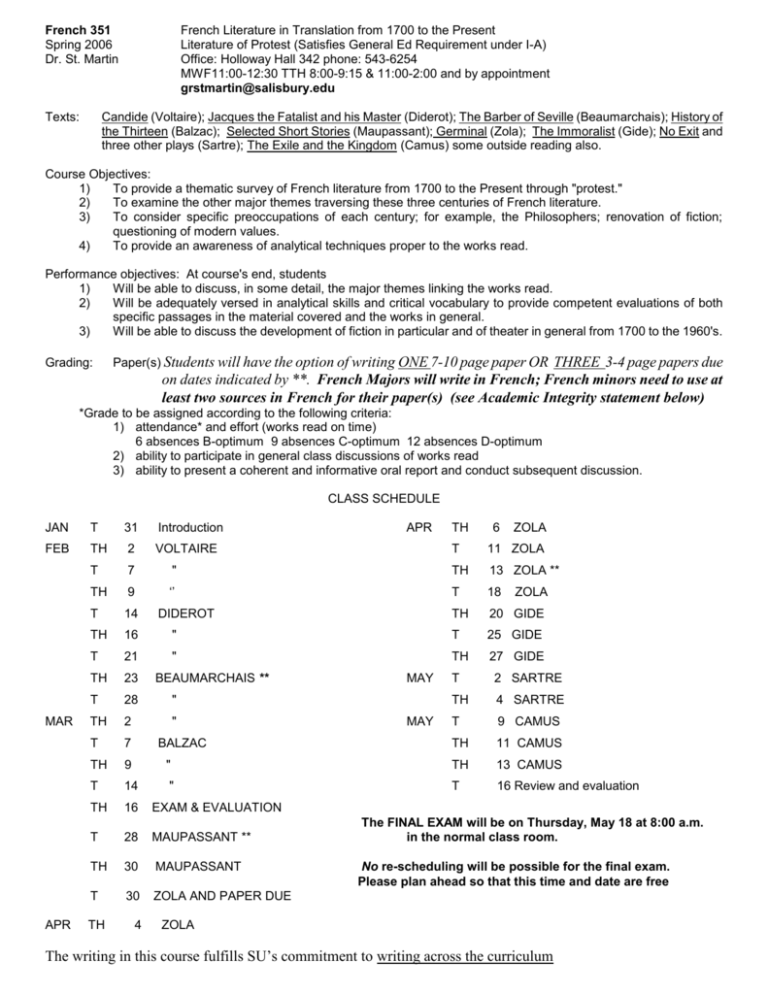
French 351 Spring 2006 Dr. St. Martin Texts: French Literature in Translation from 1700 to the Present Literature of Protest (Satisfies General Ed Requirement under I-A) Office: Holloway Hall 342 phone: 543-6254 MWF11:00-12:30 TTH 8:00-9:15 & 11:00-2:00 and by appointment grstmartin@salisbury.edu Candide (Voltaire); Jacques the Fatalist and his Master (Diderot); The Barber of Seville (Beaumarchais); History of the Thirteen (Balzac); Selected Short Stories (Maupassant); Germinal (Zola); The Immoralist (Gide); No Exit and three other plays (Sartre); The Exile and the Kingdom (Camus) some outside reading also. Course Objectives: 1) To provide a thematic survey of French literature from 1700 to the Present through "protest." 2) To examine the other major themes traversing these three centuries of French literature. 3) To consider specific preoccupations of each century; for example, the Philosophers; renovation of fiction; questioning of modern values. 4) To provide an awareness of analytical techniques proper to the works read. Performance objectives: At course's end, students 1) Will be able to discuss, in some detail, the major themes linking the works read. 2) Will be adequately versed in analytical skills and critical vocabulary to provide competent evaluations of both specific passages in the material covered and the works in general. 3) Will be able to discuss the development of fiction in particular and of theater in general from 1700 to the 1960's. Grading: Paper(s) Students will have the option of writing ONE 7-10 page paper OR THREE 3-4 page papers due on dates indicated by **. French Majors will write in French; French minors need to use at least two sources in French for their paper(s) (see Academic Integrity statement below) *Grade to be assigned according to the following criteria: 1) attendance* and effort (works read on time) 6 absences B-optimum 9 absences C-optimum 12 absences D-optimum 2) ability to participate in general class discussions of works read 3) ability to present a coherent and informative oral report and conduct subsequent discussion. CLASS SCHEDULE JAN T 31 Introduction FEB TH 2 VOLTAIRE T 7 TH 9 T 14 TH 16 T 21 TH 23 T 28 " TH 2 " T 7 TH 9 T 14 TH 16 EXAM & EVALUATION T 28 MAUPASSANT ** TH 30 MAUPASSANT T 30 ZOLA AND PAPER DUE MAR APR TH TH 6 ZOLA T 11 ZOLA " TH 13 ZOLA ** ‘’ T 18 TH 20 GIDE " T 25 GIDE " TH 27 GIDE DIDEROT BEAUMARCHAIS ** MAY ZOLA T 2 SARTRE TH 4 SARTRE T 9 CAMUS TH 11 CAMUS " TH 13 CAMUS " T 16 Review and evaluation BALZAC 4 APR MAY The FINAL EXAM will be on Thursday, May 18 at 8:00 a.m. in the normal class room. No re-scheduling will be possible for the final exam. Please plan ahead so that this time and date are free ZOLA The writing in this course fulfills SU’s commitment to writing across the curriculum Academic integrity – The best learning environment is one based on mutual respect and trust. However, the desire to achieve a good grade without doing the necessary work may tempt some students to cheat on exams or to represent the work of others as their own. At Salisbury University, plagiarism and cheating are wrong and are considered acts of “academic dishonesty” i.e. a deliberate and deceptive misrepresentation of one’s own work. Instances of academic dishonesty include all, but are not limited to, the following: *** Plagiarism – presenting as one’s own work, whether literally or in paraphrase, the work of another author *** Cheating on exams, tests, quizzes; the wrongful giving or accepting of unauthorized exam material; and the use of illegitimate sources of information *** unsanctioned collaboration with other individuals in the completion of course assignments *** Falsifying excuses for non-attendance or completion of assignments There are no mitigating circumstances to justify academic dishonesty. IF you are unclear about what constitutes academic dishonesty or plagiarism, please ask. Ignorance is no excuse. Discovery of academic dishonesty will bring stiff penalties, including a failing grade for the assignment in question and possibly a grade of F for the course. The maximum penalty at Salisbury University for plagiarism is possible expulsion from the entire USM system, so for your own sake, maintain your academic integrity. Students are responsible for all adjustments to their schedules. All changes such as drops and adds must be made online or through the Office of the Registrar. Failure to drop a course officially or withdraw officially from school will result in the issuance of the grade of "F" for all courses involved. Remember, simply stopping your attendance of a class is not an official drop or withdrawal. NEED HELP WITH A PAPER? For those students in need of assistance with papers, at the University Writing Center at Herb’s Place, trained consultants are ready to help at any stage of the writing process. It is often helpful for writers to share their work with an attentive reader, and consultations allow writers to test and refine their ideas before having to hand papers in or to release documents to the public. In accordance with Salisbury University’s mission to foster a student-centered learning community, the writing center is a student-centered place; therefore, visits are not mandatory. However, all undergraduates are encouraged to make use of this important student service. www.salisbury.edu/uwc.

